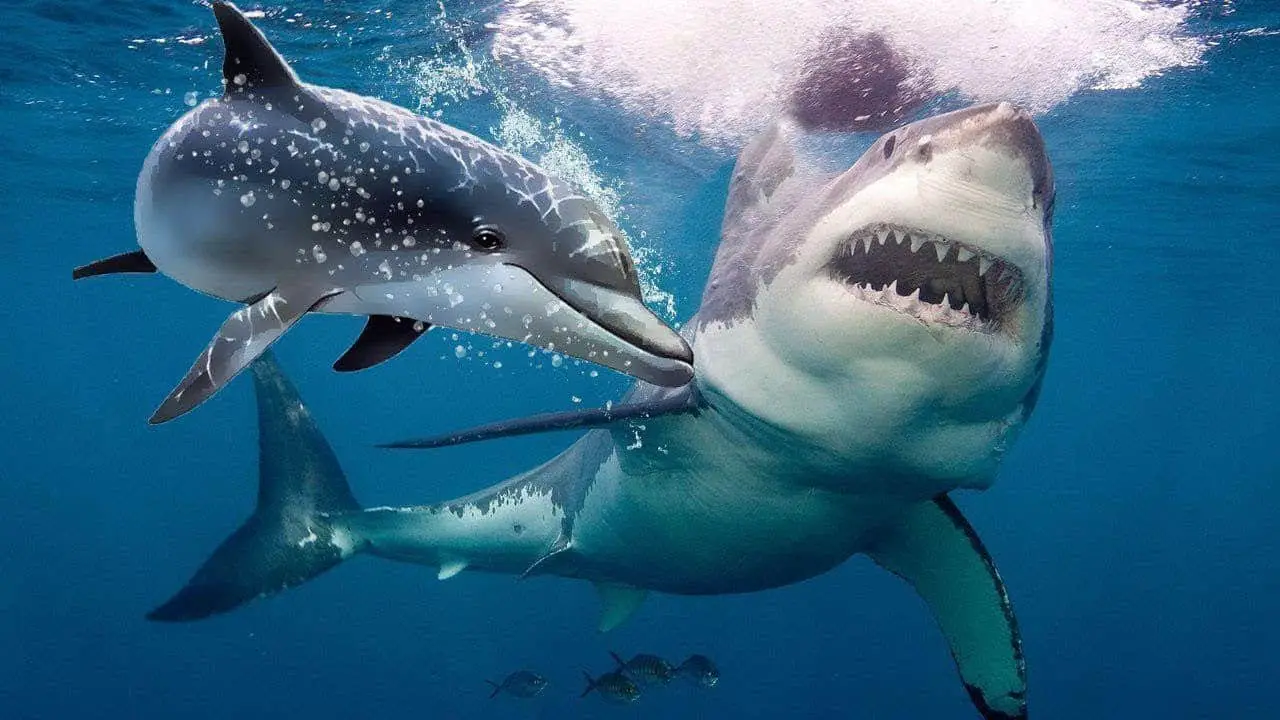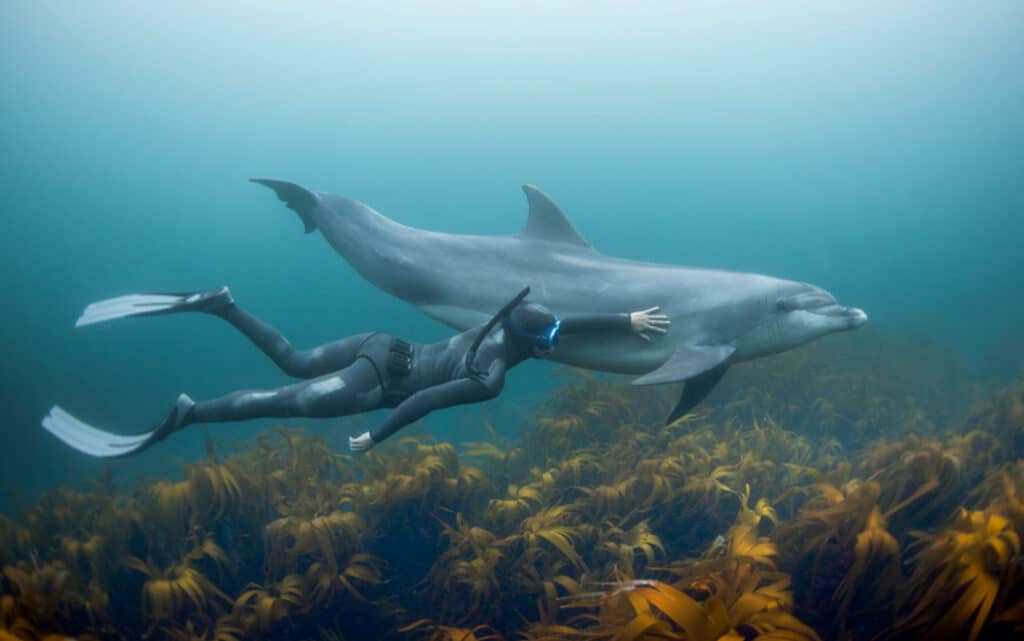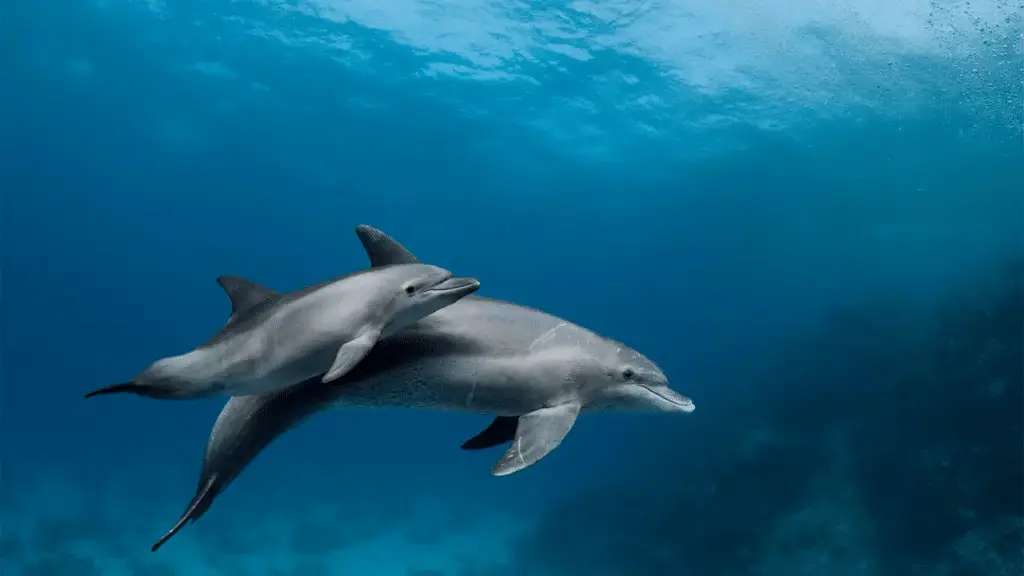Do Dolphins Keep Sharks Away

Introduction
Dolphins and sharks, two of the ocean’s most fascinating animals, have a complicated and exciting relationship. This relationship lives in the fascinating world below the ocean’s surface. Even though there is a lot of marine life in the sea, these top predators can live together has long been a subject of interest and study for marine scientists and marine life fans.
One interesting question that has caught many people’s attention is whether or not dolphins’ brains and social behavior keep sharks away. This inquiry is about marine biology. It looks at the strange relationship between these two amazing animals and the exciting idea of whether dolphins act as guardians of the sea, keeping the ocean’s most dangerous predators in check.

Will a dolphin protect you from a shark?
Whenever a group member is in danger from a shark, the rest of the pod rushes in to defend their buddy. Dolphins have even been known to protect humans in danger of sharks. Apex Prey. Orcas are the most prominent member of the dolphin family and have been known to hunt great white sharks when food is scarce.
While it is captivating to think of dolphins as guardians against shark attacks, the reality is more nuanced. Dolphins are brilliant social creatures known for their complex behaviors and communication skills. They have exhibited protective behaviors towards their pod members, including defending against threats like sharks. However, whether a dolphin would actively protect a human from a shark is less clear-cut.
Dolphins usually think of people as part of their world. How they react to us depends on how they’ve been treated in the past and what’s happening at the time. Some anecdotal reports say that dolphins protect or help humans in the water when they feel danger, such as when they meet a shark. People have noticed and admired these events, often described as dolphins making a protective circle around a swimmer or getting in the way of a shark attack.
However, it’s essential to recognize that such occurrences are relatively rare and not guaranteed. Dolphins’ behavior can vary widely, and their primary focus is typically on the well-being of their pod members, not on humans. Additionally, sharks are powerful and capable predators, and while agile and intelligent, dolphins may not always deter a determined shark.
Are sharks afraid of dolphins?
Sharks are not inherently afraid of dolphins, but their interactions with dolphins can vary depending on the shark species, the dolphins involved, and the specific circumstances. Here are some key points to consider:
Mixed Interactions: In the wild, sharks and dolphins can get along in many ways. There have been times when dolphins chased or bothered sharks, but there have also been times when they lived together quietly and seemed to ignore each other.
Predator-Prey Dynamics: Some species of dolphins, particularly larger ones like orcas (a type of dolphin), have been known to prey on smaller shark species. The dolphins may actively hunt and feed on the sharks in such cases.
Protection of Young: Dolphins are known for their protective behaviors, especially regarding their young calves. When dolphins perceive a threat to their young from a nearby shark, they may aggressively drive it away.
Group Size and Species: The dynamics can be influenced by the size and species of the shark and the dolphins. Larger, more aggressive dolphins may be more successful in deterring or dominating smaller or less aggressive shark species.
Individual Variation: Just like any animal, individual sharks and dolphins may react differently to each other. Some may be more tolerant or indifferent, while others may be more aggressive or defensive.
Environmental Factors: Environmental factors, such as the availability of food and the presence of other competing predators, can also influence the interactions between sharks and dolphins.
Are there sharks around if you see dolphins?
Not really. It’s also a common belief that sharks are unlikely to be nearby if dolphins are in the area. This is dependent on the environment and species of shark or dolphin. Sharks and dolphins share the same food source, so they’re likely to be in the same area simultaneously in hopes of catching a meal.
If dolphins are in a place, it doesn’t mean that sharks aren’t there or that they are. Even though dolphins and sharks can live together in the ocean, their interactions can be very different, and the presence or lack of one does not directly depend on the other. Here are some essential things to think about:
Differing Habitats: Dolphins and sharks may occupy different parts of the water column or habitats within the same area. For example, dolphins are often found near the surface, while sharks may patrol deeper waters.
Varied Behavior: Dolphins and sharks have distinct behaviors and feeding patterns. Dolphins are known to be more social and may often be seen playing, leaping, or traveling in groups near the surface. Sharks, conversely, maybe more solitary or territorial and may only sometimes be visible on the surface.
Predatory Dynamics: Some species of dolphins, such as orcas (killer whales), are known to prey on smaller shark species. In such cases, the presence of dolphins could signal the presence of sharks, particularly if they are hunting the same game.
Environmental Factors: The presence of both dolphins and sharks can be influenced by environmental factors such as water temperature, ocean currents, and prey availability. These factors can vary from one location to another.
Who is faster, a shark or a dolphin?
Dolphins also have the advantage of speed, as they can swim faster than most shark species. Of course, dolphins’ giant advantage over sharks is intelligence, primarily through echolocation (when dolphins send sound waves through the ocean).
In a straight-line swim, dolphins are generally faster than most species of sharks. Dolphins are known for their exceptional swimming abilities and agility, which allow them to reach impressive speeds. Some dolphin species, like the common dolphin, can swim up to 60 kilometers per hour (37 miles per hour). Other species, like the orca or killer whale, can reach 56 kilometers per hour (34 miles per hour) or even faster.
On the other hand, sharks are potent hunters and great swimmers, but their top speeds vary from species to species. Most shark species swim at speeds between 5 and 12 miles per hour (8 to 19 kilometers per hour). But some sharks, like the shortfin mako shark, can go about 50 kilometers per hour (31 miles per hour).
So, in a direct speed comparison, dolphins are faster swimmers than most sharks. However, it’s important to note that speed alone doesn’t necessarily determine the outcome of interactions between these two marine creatures, as factors like agility, intelligence, and the specific circumstances of the encounter can also play crucial roles in their interactions.
Are sharks more intelligent than dolphins?
Great Whites and Manta Rays are among the most intelligent of the shark and ray species and are pretty clever. But as far as we are aware, based on what we know, they are on a different level than dolphins.
Sharks and dolphins have different types of intelligence, and it’s challenging to directly compare the two because they have evolved in distinct ways to adapt to their respective environments.
Dolphins are renowned for their high level of intelligence among marine animals. They have large brains relative to their body size and sometimes exhibit complex behaviors such as problem-solving, social interaction, communication, and even tool use. Dolphins, particularly bottlenose dolphins, are known for their advanced cognitive abilities and have demonstrated self-awareness, the ability to learn and follow commands, and even the capacity for creative play.
Sharks, on the other hand, have a different kind of brain that is more focused on hunting and staying alive. They have well-developed senses, like a strong sense of smell and sensitivity to electromagnetic fields, which help them find food over long distances. Even though sharks don’t have the same problem-solving and social skills as dolphins, they have changed over millions of years to become very good hunters with specialized hunting techniques.
Are dolphins more challenging than sharks?
In addition to size and strength, sharks also have the advantage of being able to defend themselves more easily than dolphins due to their tough skin and cartilaginous skeleton, which is far less vulnerable than dolphins.
The comparison between dolphins and sharks in terms of which is more challenging is subjective and depends on the context and perspective from which one approaches the question.
Dolphins, with their highly developed cognitive abilities, complex social structures, and capacity for problem-solving, can present challenges in scientific study and conservation efforts. Researchers often invest significant time and resources to understand their behavior, communication, and ecological needs.
On the other hand, sharks can pose unique challenges when studying their elusive behaviors and their role as apex predators in marine ecosystems. Tracking and monitoring these creatures, ranging from small reef sharks to massive species like great white sharks can be logistically challenging and potentially dangerous.
From a human perspective, interacting with dolphins and sharks can present challenges. Swimming with dolphins, for example, requires a respectful approach to minimize stress and disruption to these sensitive creatures. Swimming with certain species of sharks, such as reef sharks, can also be done safely with proper precautions, but it requires knowledge and understanding of shark behavior and safety measures.
Are dolphins or sharks safer?
Dolphins and sharks are wild animals and can pose a risk to humans, but the circumstances and frequency of danger differ. Sharks are often considered more dangerous because some species (such as the Great White, Tiger, and Bull Sharks) have been known to attack humans.
Regarding safety to humans, dolphins are generally considered safer than sharks. However, it’s essential to clarify the context of this comparison:
Dolphins: Dolphins are not typically considered a threat to humans. They are often sought after for recreational activities such as dolphin-watching tours and swimming experiences. While dolphins are large and powerful animals, they are generally known for their friendly and playful behavior towards humans. There have been rare incidents of dolphins behaving aggressively, but these are exceptions rather than the norm. When interacting with dolphins, it’s crucial to do so responsibly and in a manner that does not disrupt their natural behaviors.
Sharks: Sharks, while not inherently seeking out humans as prey, are still wild predators and should be treated cautiously and respectfully. There are over 500 species of sharks, most of which are not dangerous to humans. However, a few species, such as the great white and tiger sharks, have been involved in shark attacks on humans. These incidents are sporadic and often occur when a shark mistakes a human for prey. Shark attacks can have serious consequences, but they are statistically unlikely.
Are sharks friendly to humans?
Most sharks are not dangerous to humans — people are not part of their natural diet. Despite their scary reputation, sharks rarely attack humans and would much instead feed on fish and marine mammals. Only about a dozen more than 300 species of sharks have been involved in attacks on humans.
Sharks are not inherently friendly or unfriendly toward humans. Instead, they are wild animals with natural behaviors and instincts shaped by millions of years of evolution. Sharks do not possess the same social or emotional characteristics as some animals considered friendly or domesticated, like dogs or dolphins.
Most shark species are not interested in interacting with humans and will avoid them. Most shark encounters with humans occur when a shark mistakes a swimmer, surfer, or other water activity participant for prey. In such cases, the shark’s actions are driven by its natural predatory instincts, not by hostility or aggression toward humans.
It’s important to note that shark attacks on humans are relatively rare, considering the vast number of people who engage in water activities in shark-inhabited areas. Sharks are an essential part of marine ecosystems and play a crucial role in maintaining the health and balance of the ocean.
While sharks are not friendly in the way we might think of social animals, treating them with respect and caution is crucial when encountering them in their natural habitat. Responsible behavior and adherence to safety guidelines can help minimize the risk of shark encounters and promote coexistence between humans and these vital apex predators of the oceans.

Conclusion
The dynamic between dolphins and sharks in the vast expanse of the ocean remains a subject of intrigue and wonder. While evidence suggests that dolphins may, at times, exhibit protective behaviors or deter sharks from their vicinity, it is essential to remember that this interaction is far from a definitive strategy for keeping sharks at bay. Dolphins are renowned for their intelligence, social bonds, and agility, making them formidable creatures in their own right. However, as ancient and highly adapted apex predators, sharks have evolved their own set of strategies for survival.
The ocean is a complex ecosystem where countless factors, including environmental conditions, species-specific behaviors, and the element of chance, shape the interactions between these two extraordinary marine species. While dolphins may offer protection in certain situations, they cannot be relied upon as universal guardians against shark encounters.
Ultimately, the coexistence of dolphins and sharks underscores the intricate tapestry of life in the ocean, where each species uniquely maintains the balance of marine ecosystems. Our fascination with these remarkable creatures reminds us of the profound mysteries unfolding beneath the waves, sparking a sense of awe and appreciation for the incredible diversity of life in our oceans.



